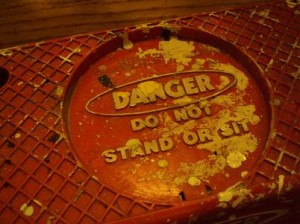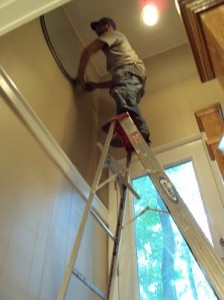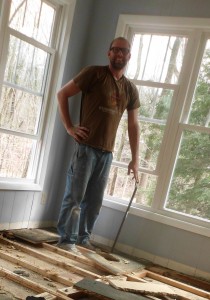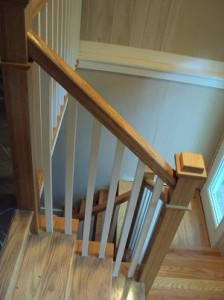My builder (and nephew-in-law) Drew is closing in on the end of our 10 week project. On our tag list today was a chore he definitely didn’t have to do but kindly acquiesced to: hanging a heavy, round mirror 40 inches in diameter. Putting it on the hook wasn’t the problem. It was where that hook was located, 16 feet above the floor.
In order to reach it, Drew had to climb onto the top step of a six foot ladder and perch there without support while holding the heavy mirror, which he had to lift high. If the ladder wiggled or he made a misstep, he’d surely fall. And if he did, he’d hit a square-edged newel post far below, tumbling down the steps to the basement, probably with the mirror shattering over him.
But the fearless Drew said, “Oh, I’ve had worse falls than that. Don’t worry.”
Worrying more, I said, “But Dad told us there’s never a good reason to stand on the top step of a ladder.” I was half hoping to stop him, but half hoping he’d hang my mirror anyway.
Klaus, his girlfriend Brooke and I held our breath as Drew climbed the ladder, as if an audience might prevent an accident. Drew successfully placed the mirror’s back-wire over the wall hook, and as we all admired his work, suddenly the 60 year old wire snapped, and the mirror careened down the wall.
Drew’s lightning instinct, even while on the top step, was to lift his knee (so now he’s teetering on one leg) and pin the falling mirror to the wall with his foot as it raced toward a narrow shelf half way down the wall.
Brooke and I gasped, envisioning Drew and the mirror both going overboard. Klaus leaped forward to help. But as Drew remained focused on saving the mirror, he also remained on the ladder.
The heavy mirror made a major dent in the shelf, despite Drew’s slowing its descent, but thankfully we had wood filler, sand paper and paint handy. After a trip to the store for new braided wire, we restrung it, and Drew repeated his risky maneuver (thus the photo).
How different our day would have been, had we needed 911.
But isn’t that true of any day? Only God knows what 24 hours will bring, which is why it’s good to turn over those hours to him every morning. Then, no matter what happens, we know God allowed it, and because of that, he’ll get us through it.
This web site is called “Getting Through This” because no one is exempt from troubles, and all of us have things to get through. I’ve learned the extent to which God will go in accomplishing this for us as I’ve gotten through the last 19 months without Nate. And I have confidence if Drew had fallen today, God would have brought him through that, too.
Now when I walk past that mirror countless times each day, I’ll hear the Lord’s voice: “We’ll get through it all… together.”
“Surely God is my help; the Lord is the one who sustains me.” (Psalm 54:4)







